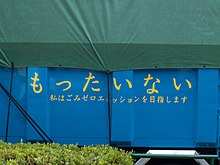This is an old revision of this page, as edited by Hijiri88 (talk | contribs) at 08:08, 23 November 2019 (Version D. Will revert momentarily pending opinions.). The present address (URL) is a permanent link to this revision, which may differ significantly from the current revision.
Revision as of 08:08, 23 November 2019 by Hijiri88 (talk | contribs) (Version D. Will revert momentarily pending opinions.)(diff) ← Previous revision | Latest revision (diff) | Newer revision → (diff) Japanese termFor the accelerated patent examination program also known as PPH 2.0, see Patent Prosecution Highway.

Mottainai (もったいない or 勿体無い) is a term of Japanese origin that has been used by environmentalists. The term in Japanese conveys a sense of regret over waste; the exclamation "Mottainai!" can translate as "What a waste!" Japanese environmentalists have used the term to encourage people to "reduce, reuse and recycle", and Kenyan environmentalist Wangari Maathai used the term at the United Nations as a slogan to promote environmental protection.
Etymology and modern usage
Kōjien lists three definitions for the word mottainai (classical Japanese terminal form mottainashi): (1) inexpedient or reprehensible towards a god, buddha, noble or the like; (2) awe-inspiring and unmerited/undeserved, used to express thanks; (3) an expression of regret at the full value of something not being put to good use. In contemporary Japanese, it is most commonly used to indicate that something is being discarded needlessly, or to express regret at such a fact, although (1) is in fact the oldest sense of the word.
Modern Japanese environmentalism
In November 2002, the English-language, Japan-based magazine Look Japan ran a cover story entitled "Restyling Japan: Revival of the 'Mottainai' Spirit", documenting the motivation amongst volunteers in a "toy hospital" in Japan to "develop in children the habit of looking after their possessions", the re-emergence of repair shops specializing in repairing household appliances or children's clothes, the recycling of PET bottles and other materials, the collection of waste edible oil, and more generally the efforts to stop the trend of throwing away everything that can no longer be used, i.e. the efforts of reviving "the spirit of mottainai". In that context, Hitoshi Chiba, the author, described mottainai as follows:
We often hear in Japan the expression 'mottainai', which loosely means 'wasteful' but in its full sense conveys a feeling of awe and appreciation for the gifts of nature or the sincere conduct of other people. There is a trait among Japanese people to try to use something for its entire effective life or continue to use it by repairing it. In this caring culture, people will endeavor to find new homes for possessions they no longer need. The 'mottainai' principle extends to the dinner table, where many consider it rude to leave even a single grain of rice in the bowl. The concern is that this traditional trait may be lost.
At the Opening Ceremony of the Science and Technology in Society Forum in 2005, Japanese Prime Minister Junichiro Koizumi stated: "In Japan, there has long been a spirit characterized by the word mottainai, which could be translated as 'don't waste what is valuable'."
Use by Wangari Maathai

At a session of the United Nations, Kenyan environmentalist Wangari Maathai introduced the word mottainai as a slogan for environmental protection. According to Mizue Sasaki,
Dr. Maathai, brandishing a t-shirt emblazoned with the word MOTTAINAI, explained that the meaning of the term mottainai encompasses the four Rs of reduce, reuse, recycle and repair ... made the case that we should all use limited resources effectively and share them fairly if we are to avert wars arising from disputes over natural resources.
Maathai has worked to popularize the word mottainai in places outside Japan. At the 2009 United Nations Summit on Climate Change, she said, "Even at personal level, we can all reduce, re-use and recycle, what is embraced as Mottainai in Japan, a concept that also calls us to express gratitude, to respect and to avoid wastage."
See also
- Affluenza
- Anti-consumerism
- Bal tashchit
- Conspicuous consumption
- Freeganism
- Frugality
- Mottainai Grandma
- "Mottai Night Land", a Kyary Pamyu Pamyu song which has Mottai nai in the title
- Muda, mura and muri, three types of waste in lean manufacturing
- Planned obsolescence
- Simple living
References
Citations
- ^ Hasegawa 1983, p. 25.
- ^ Chiba, Hitoshi (November 2002). "Restyling Japan: Revival of the "Mottainai" Spirit". Look Japan. Archived from the original on April 5, 2004. Retrieved July 22, 2013.
- "Speeches and Statements by Prime Minister Junichiro Koizumi". japan.kantei.go.jp.
- Cite error: The named reference
JAS2014was invoked but never defined (see the help page). - Sasaki, Mizue (7–9 November 2005). Perspectives of language: cultural differences and universality in Japanese (PDF). Paris: UNESCO. pp. 124–125.
{{cite conference}}: Cite has empty unknown parameter:|booktitle=(help) - Iwatsuki, Kunio (2008). Sustainable Use of Biodiversity, with Reference to the Japanese Spirit of Worshipping Nature (in "Conserving Nature, A Japanese Perspective") (PDF). Biodiversity Network Japan. pp. 4–11. ISBN 978-4-9901743-1-6. Archived from the original (PDF) on January 9, 2015. Retrieved July 25, 2013.
- "Statement by Prof. W. Maathai, Nobel Peace Laureate, on behalf of Civil Society" (PDF). United Nations. Archived from the original (PDF) on 2011-06-01. Retrieved 24 February 2018. Cited in Maruko Siniawer, 2014, p. 177.
Works cited
- Hasegawa, Kōhei (1983). "Mottai-nashi Kō". Academic Bulletin of Nagano University. 4 (3–4): 25–30.
{{cite journal}}: Invalid|ref=harv(help)
External links
| Japanese social concepts and values | |||||
|---|---|---|---|---|---|
| Sociocultural values |
| ||||
| Aesthetics | |||||
| Etiquette and social norms | |||||
| Types of people |
| ||||
| Work culture | |||||